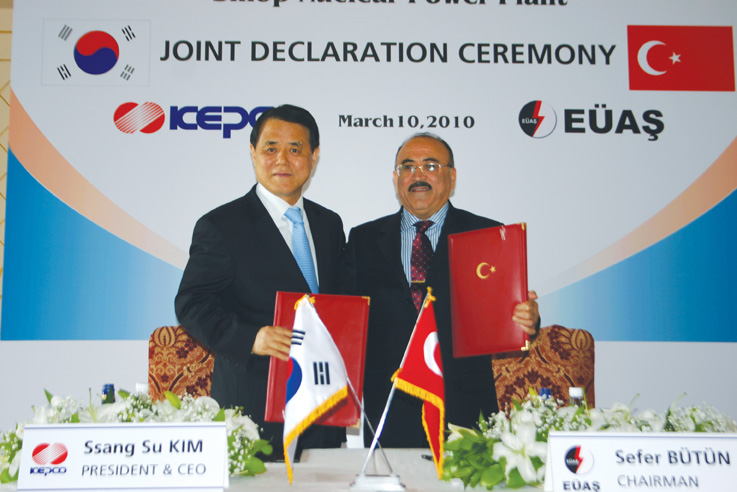Korea Comes Closer to Nuclear Power Deal with Turkey
KEPCO inks a joint declaration with EUAS

Korea Electric Power Corp. (KEPCO) and Turkey's state-run power company have agreed to joint research on the introduction of the Korean nuclear power reactor model APR1400, raising the possibility that Korea will gain a foothold in the Turkish nuclear power plant construction market.
KEPCO Chairman and CEO Kim Ssang-su and his counterpart EUAS President Sefer Butin signed a joint declaration to that effect on March 10 in Ankara in connection with the construction of nuclear power units in the Sinop area.
KEPCO said the deal could be interpreted as proof that Korea has laid the groundwork for entering the Turkish nuclear power market through collaboration with Turkey in their joint research on the nuclear power unit project in the Sinop area.
In particular, KEPCO has built a solid foundation for making its foray into Turkey by publicizing Korea's capability to build nuclear power units to Turkish officials in order to participate in the nuclear power plant projects there.
Turkish Prime Minister Tayyip Erdogan announced the signing of the joint declaration on nuclear power during the closing session of the Korean-Turkish Business Forum in Istanbul on March 9-10, making a cautious forecast that Korea will enter the Turkish market.
Kim Kyeong-min, deputy manager of project development at KEPCO, said KEPCO has so far established a base for entering the Turkish market and KEPCO will make flat-out efforts to export Korean nuclear units to countries wanting to utilize nuclear power.
Amid a buoyant mood following Korea's landmark winning of a $40 billion nuclear power deal from the United Arab Emirates last Dec. 27, KEPCO now has an ambitious plan to become a word-class company with the goal of raking in $76 billion (85 trillion won) in sales by 2020.
CEO Kim told reporters on Feb. 9 that his utility company, which posted 33.6 trillion won in sales in 2009, aims at growing into a global energy company equivalent to General Electric by 2020. Kim said, "On top of domestic electricity sales, KEPCO"'s presence in five or six overseas business categories, including nuclear power plant export, nuclear power services, resources exploration, independent power providers (IPP) and smart grid, will flourish in earnest in a decade or later." nw
KOPEC Chairman Kim Ssang-su signs a joint declaration on nuclear energy with his Turkish state-run power company EUAS President Sefer Butin on March 10 in Ankara.
Korea Sees Its Own Uranium Development Rate Surge to 22%
KEPCO's acquired a 17% stake in miner Denison and 10% stake in the Imouraren Mine
Korea Electric Power Corp. (KEPCO) has secured an annual supply of about 1,000 tons of uranium by acquiring a 17 percent stake in Canada's Denison and a 10 percent interest in a uranium mine in Niger in 2009 in an effort to ensure a stable supply of nuclear fuel. The deals have led to increasing KEPCO's uranium development rate from naught to 22 percent.
KEPCO became the largest shareholder of Denison when it signed a contract to purchase a 17 percent stake in the Canadian mine developer last June. Under the deal, KEPCO plans to import 300 tons of uranium monthly for the next six months by securing 1,800 tons, equivalent to 20 percent of its uranium production during the period.
Denison, an integrated uranium mine developer, owns three operating mines in the United States and Canada and is exploring scores of uranium mine reserves in North America, Africa and Mongolia. The company also runs a uranium refining plant both in the United States and Canada.
KEPCO inked a contract to acquire a 10 percent stake in Imouraren Mine last December through its participation in the issuance of shares of the operating company, Imouraren SA, held jointly by Areva NC Expansion (ANCE), a subsidiary of Areva SA, and the Nigerien government.
The agreement gave KEPCO the right to secure 18,000 tons of uranium, equivalent to about 10 percent of the mine's production. As a result, KEPCO plans to bring in an annual average of 700 tons of uranium, which is equivalent to some 15 percent of Korea? annual consumption estimated at 5,000 tons, during the period between 2013 and 2024.
The latest deal raises Korea's own uranium development rate to 22 percent by adding 7 percentage points to the rate through its acquisition of the stake in Denison, KEPCO officials said.
The Imouraren Mine is the world's second largest uranium mine with more than 200,000 tons of discoverable reserves, following the Olympic Dam Mine in Australia. The Niger mine has been the target of top priority investments in the uranium field since Areva has been with the mine and brought cheaper production unit prices.
Additionally, KEPCO is engaged in two uranium exploration projects in Canada and the company plans to acquire more uranium mines and uranium mine developers in uranium-rich countries in Africa and Central Asia. nw
3Fl, 292-47, Shindang 6-dong, Chung-gu, Seoul, Korea 100-456
Tel : 82-2-2235-6114 / Fax : 82-2-2235-0799